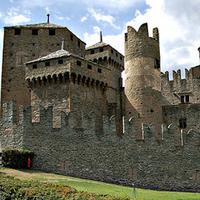11. Cosa era un monastero
|||monastery
11. Was war ein Kloster?
11. What was a monastery
11. O que é um mosteiro?
Si trattava di una costruzione piena di monaci; questi erano uomini che avevano scelto di servire Dio in un modo speciale.
It was a building full of monks; these were men who had chosen to serve God in a special way.
Это была конструкция, полная монахов; это были люди, которые решили служить Богу особым образом.
Un convento era come un monastero, solo che era destinato alle donne, chiamate suore.
|||||||||destined||||nuns
A convent was like a monastery, only it was intended for women, called nuns.
Монастырь был похож на монастырь, только для женщин он назывался монахинями.
Monaci e suore facevano speciali promesse chiamate voti; giuravano di non possedere alcuna proprietà, né di sposarsi e di obbedire alle persone in carica.
|||||||vows|they swore||||no|property||||||to obey||||in charge
Monks and nuns made special promises called vows; they vowed not to own any property, nor to marry and obey the people in charge.
Монахи и монахини давали особые обещания, которые назывались обетами; они поклялись не владеть какой-либо собственностью, не жениться и не подчиняться ответственным людям.
Le persone considerate in carica erano l'abate o il priore nei monasteri, mentre in un convento di suore la badessa.
||considerate||||the abbot|||prior||||||||||abbess
The persons considered in office were the abbot or the prior in the monasteries, while in a convent of nuns the abbess.
Люди, которых считали при исполнении служебных обязанностей, были настоятелем или настоятелем в монастырях, в то время как настоятель находился в женском монастыре.
I monasteri e conventi seguivano regole molto rigide; questi furono all'inizio creati da un santo cristiano chiamato Benedetto.
||||they followed|||||||||||Christian||
The monasteries and convents followed very strict rules; these were first created by a Christian saint named Benedict.
Монастыри и монастыри следовали очень строгим правилам; Первоначально они были созданы христианским святым по имени Бенедикт.
Per diventare monaci era necessario essere un uomo ed essere cristiano; si iniziava con il noviziato, questo significa che bisognava seguire le regole e imparare i modi che esistevano in un monastero.
|||||||man||||||||novitiate|||||||||to learn|||||||
To become monks it was necessary to be a man and be a Christian; we started with the novitiate, this means that we had to follow the rules and learn the ways that existed in a monastery.
Чтобы стать монахами, нужно было быть человеком и быть христианином; мы начали с новичка, это означает, что мы должны были следовать правилам и учиться тому, что существовало в монастыре.
Solo dopo era possibile prendere i voti e diventare un vero monaco; alcune persone trovarono questo troppo difficile, altri trascorsero la loro intera vita servendo Dio.
||||||||||||||they found|||||they spent||||||God
Only then was it possible to take vows and become a true monk; some people found this too difficult, others spent their entire life serving God.
Только позже стало возможным принять обеты и стать настоящим монахом; некоторые люди находили это слишком трудным, другие всю жизнь служили Богу.
A parte pregare privatamente e insieme, i monaci di solito curavano i malati, insegnavano, davano cibo e denaro ai poveri e cercavano di aiutare la gente; inoltre coltivavano il cibo, facevano la birra e allevavano le api.
in|||privately|||||||they cared||sick|they taught||||||||||||||they cultivated|||||||they raised||bees
Aside from praying privately and together, monks usually nursed the sick, taught, gave food and money to the poor, and tried to help people; they also grew food, brewed beer, and raised bees.
Si trattava di un lavoro molto difficile ma al tempo stesso di una vita in pace.
It was a very difficult job but at the same time a life in peace.
Nel medioevo pochissime persone sapevano scrivere o leggere; i primi scritti di eventi locali furono eseguiti dai monaci o dalle suore.
|||||||||||||||executed|||||
In the Middle Ages very few people knew how to write or read; the first writings of local events were performed by monks or nuns.
Questi erano solitamente documenti decorati in maniera meravigliosa, scritti con una penna di piume; essi furono chiamati “manoscritti illuminati”.
|||||||||||||feathers||||manuscripts|illuminated
These were usually wonderfully decorated documents, written with a feather pen; they were called "illuminated manuscripts".
Se oggi qualcuno volesse realizzare un manoscritto proprio, ciò sarebbe possibile, ma ci vorrebbero anni per essere in grado di farlo bene; sarebbe anche possibile realizzare una propria penna di piume.
if|||he wanted|||||||||||||||||||||||||||
If today someone wanted to make their own manuscript, this would be possible, but it would take years to be able to do it well; it would also be possible to make your own feather pen.
Если бы сегодня кто-то хотел сделать свою собственную рукопись, это было бы возможно, но потребовались бы годы, чтобы сделать это хорошо; было бы также возможно сделать свою собственную ручку пера.
Per prima cosa è necessaria una grossa penna di un volatile; una penna di oca sarebbe la migliore; per realizzare il pennino si deve tagliare la parte finale della penna.
||||||||||volatile||||duck|||||||nib||||||||
First you need a large bird pen; a goose feather would be the best; to make the nib the final part of the pen must be cut.
Сначала вам нужна большая птичья ручка; гусиное перо будет лучшим; чтобы сделать кончик, необходимо отрезать конечную часть пера.
Questa operazione permette di immergere la penna nell'inchiostro e provare a scrivere con essa; si consiglia di usare una penna diversa per ogni tipo di inchiostro colorato.
||||to immerse|||in the ink||||||her||it is advised||||||||||ink|
This operation allows you to immerse the pen in the ink and try to write with it; it is recommended to use a different pen for each type of colored ink.

